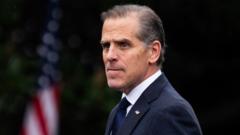Elon Musk's Department of Government Efficiency (Doge) asserts significant government savings, but investigations indicate flaws in its claims, with experts urging caution regarding the reported figures and their veracity.
Scrutinizing Elon Musk's Doge: Claims of Billions in Government Savings Under Fire

Scrutinizing Elon Musk's Doge: Claims of Billions in Government Savings Under Fire
Analyses reveal questionable evidence behind Elon Musk's Department of Government Efficiency's big savings claims, suggesting discrepancies in reported figures.
Elon Musk's initiative, the Department of Government Efficiency (Doge), has made headlines by claiming to reduce US government spending significantly, reporting an average savings of over $10 billion weekly since President Trump took office, totaling nearly $200 billion. Musk initiated this agency to cancel contracts, grants, and leases from previous administrations and reduce fraud, in an ambitious effort to cut at least $2 trillion from the federal budget.
However, a comprehensive analysis conducted by BBC Verify has raised skepticism regarding the authenticity of these claims. The Doge website indicates claimed savings of $160 billion as of April 20, although less than 40% of these are substantiated with individual evidence. Critics note that actual savings may be significantly lower or exaggerated, while some reported figures lack proper documentation.
In a review of Doge's largest reported savings totaling $8.3 billion, experts found that many claims were based on speculative figures rather than concrete contract terms. For instance, the highest reported savings of $2.9 billion in relation to a contract for housing migrant children appears to be calculated from maximum contract values rather than actual incurred costs, with experts stating that the true savings from early contract termination were around $153 million.
Further scrutiny has uncovered that additional purported savings involved contracts with the IRS and the Department of Defense that either lacked clarity on amounts spent or were reportedly terminated prior to Doge's involvement. The lack of accounting for actual expenditures raises questions about the credibility of the reported savings figures.
While Doge has managed to attract attention for its spending cuts, the absence of reliable evidence for its larger claims makes it difficult to verify its total impact on government spending accurately. Inquiries directed at the White House for more transparency regarding these savings claims have yet to yield results, leaving many aspects of Doge's efficiency drive shrouded in ambiguity.




















